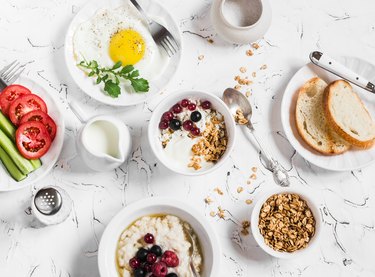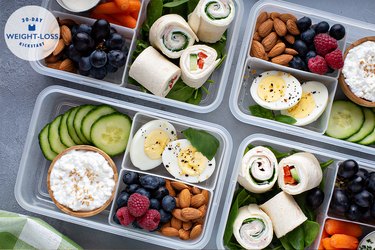
We've all been there – so busy, focused or stressed – that we forget to eat. But when you skip a meal, you also skip out on essential nutrients your body needs, which affects how you function during the day, not to mention your overall health.
Here, we spoke to Leslie Langevin, RD, author of The Anti-Inflammatory Kitchen Cookbook and co-owner of Whole Health Nutrition, to learn how to fill your nutrient cup when you've missed mealtime, plus tips to help you stay on a consistent eating schedule.
Video of the Day
Video of the Day
What Happens to Your Body When You Skip a Meal
While skipping a meal once in a while is probably not cause for concern, if you're in the habit of forgetting to eat, it can have negative effects on your body. Here are a few:
1. When You Skip Complex Carbs, You Have Less Energy
Carbs are like fuel for your body's engine. Specifically, complex carbohydrates — which are digested slowly — supply sustained energy throughout the day, Langevin says. They also have B vitamins, which help your body release energy from food and support brain health (think: better focus and concentration), according to the USDA.
So, it goes without saying: When you don't fill your tank (with complex carbs), you'll be running on empty.
In fact, if you don't get enough food and nutrients to fire up your body's engine, a process called catabolism occurs, where your body uses up its own stores of energy (and can even include muscle breakdown), Langevin says.
2. When You Skip Fiber, You’re More Likely to Overeat Later
Fiber — found in foods with complex carbs such as peas, beans, whole grains and vegetables — helps to keep you satiated and your blood sugar levels steady, Langevin says. That's because it slows your body's absorption of sugar. Without enough fiber, your blood sugar will spike and dip, causing cravings and hunger pangs.
Put another way, when you forego fiber earlier in the day, your appetite will likely be bigger at your next meal, Langevin says. And this ravenous hunger can lead to overeating, she adds.
3. When You Skip Protein, Your Body Can’t Repair Itself
"Overnight, our body has been in a fasting state, running on our energy stores," Langevin says. When we "break fast," our bodies stop dipping into storage and start using food for energy. And eating enough protein plays a pivotal role in this process.
"We need to supply a good source of protein to provide the necessary amino acids and building blocks for continued operation and repair of our body," Langevin says.
But when you skip a meal — and deprive your body of protein — your muscles can't properly repair, rebuild and recover, Langevin says.
What's worse, catabolism can take place, and your body may break down muscle for energy, she adds.
How to Make Up for a Missed Meal
"To make up for one missed meal, it comes down to making sure you are having a balanced meal at least twice per day" along with accompanying nutrient-dense snacks, which Langevin calls "mini" meals.
Here, Langevin explains how to build a balanced meal.
1. Pair a Protein and a Complex Carb With Ample Fiber
These nutrients will compensate for what you lacked by skipping your last meal.
- Good options for lean protein:
- Eggs
- Beans
- Chicken
- Turkey
- Tofu
- Yogurt
- Nuts and seeds
- Good options for fiber-rich complex carbs:
- Brown rice
- Quinoa
- Oats
- Sweet potatoes
- Whole-grain pasta
- Beans
"Making up for protein is harder because the body only absorbs a certain amount each eating window to use for muscle recovery (the rest is used for energy)," Langevin says. Aim for 20 to 30 grams of protein per meal to compensate for what you missed earlier in the day.
Meals With Fiber and Protein to Try
- 1 cup of quinoa + 1/2 cup of sweet potatoes + veggies + 4 oz chicken or tofu + 3 Tbsp. nuts/seeds + 1 to 2 Tbsp. dressing
- A whole-wheat burrito with an egg or 4 oz chicken + 1/2 cup beans + veggies + 1/2 cup of brown rice + salsa + cheese
- A bowl of whole-grain pasta with veggies + cheese + another protein source (4 oz chicken or 1/2 cup legumes) with pesto
2. Next, Add a Nutrient-Dense Snack to Your Main Dish
This is a good opportunity to get a little bit more protein as well as your fruits and veggies (read: essential vitamins and minerals), Langevin says.
Nutrient-Rich Snacks to Try
- 1 cup Greek yogurt + 1/2 cup granola + a handful of nuts/seeds + 1 cup fruit
- A small whole-wheat wrap + hummus + veggies + cheese
- Dark chocolate protein bites + 1 cup berries
Tips to Help You Not Skip Meals
While it's possible to compensate for a missed meal by filling your others with protein, complex carbs and fiber, Langevin says you should try to avoid skipping meals altogether: "It is better to spread your nutrients out over the whole day for your optimal functioning versus cramming them all into a few meals."
Here's how to build the habit of eating regularly scheduled meals.
1. Set a Timer
If you tend to forget breakfast or lunch, setting a reminder on your phone is an easy way to prompt you to take a break to eat, Langevin says.
2. Have Pre-Packaged Snacks on Hand
"If you 'don't have time' for breakfast in the morning, prep easy-to-grab breakfasts to eat while running out the door," Langevin says. "Something small is better than nothing." And always pack a few extra snacks in your bag for the middle of the day. Together, they can serve as a mini midday meal.
On-the-Go Snacks to Try
- A drinkable yogurt
- A protein bar
- A pre-made smoothie
- A banana + a packet of peanut butter
- A Greek yogurt + trail mix + fruit
- Almond butter packet + whole-grain crackers + fruit
- Pre-sliced apples + cheese sticks + nuts
- A hardboiled egg + cheese + pre-cut veggies
And always pack a few extra snacks in your bag for the middle of the day. Together, they can serve as a mini midday meal.
3. Build Your Meal Prepping Muscle
If you're prone to forgetting or skipping meals, you should consider meal prepping breakfast, lunch or dinner the day ahead, Langevin says.
"Planning is a habit that takes time to build, but it can really change how you feed your body during the day and improve your energy," she says. And, like most skills, the more you do it, the more successful you will be at it, she adds.


